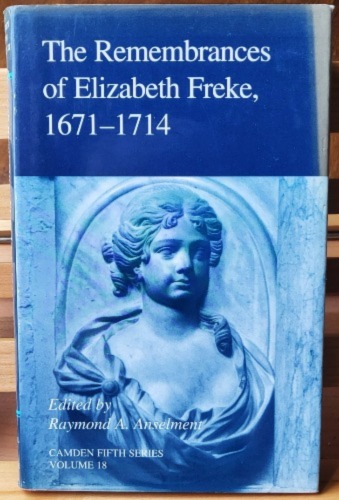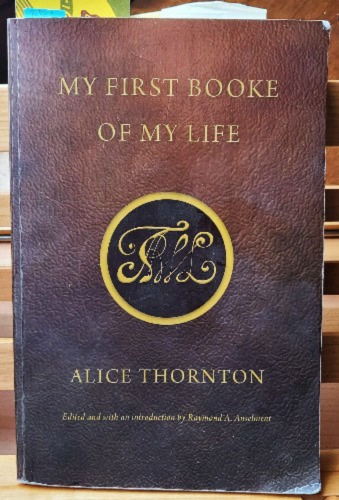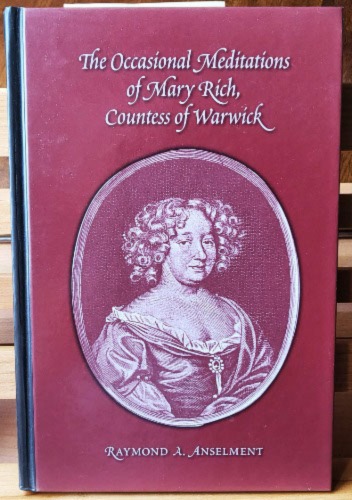Professor Raymond Anselment: A Commemoration
Before the news of Queen Elizabeth II’s death, those of us who had gathered for our Alice Thornton’s Books end of project year board meeting (8 September 2022) were paying our respects to the remarkable contribution made to the study of early modern women’s writing by Professor Raymond Anselment.

It was only after the announcement of his death that we discovered that Ray’s final academic activity had been to attend the first Alice Thornton’s Books project board in March 2022. As had been planned, he joined us via Teams from his home in Connecticut, USA while his wife, Carol, helped him to navigate the technology.[1]
Ray was one of the first people with whom we shared Cordelia's discovery of the Book of Remembrances, and he played a vital role in establishing its authenticity. Until then, that volume was thought only to survive in a microfilm copy deposited at the Beinecke library, Yale.
For me, asking Ray for assistance, was the obvious choice. Not only because he was the editor of My First Booke of My Life, but because I knew how much he liked to work at the Beinecke as he had kindly driven me there on several occasions when I held a visiting professorship at the University of Connecticut in 2007.
Characteristically not mentioning he was unwell, Ray agreed to check the images we sent him from the UK and swiftly confirmed that the microfilm was a copy of the manuscript Cordelia had located. He also helped us in our application to the AHRC for funding by sharing his notes on Book 3 when we were unable to access the British Library manuscript due to Covid-19 restrictions.
Over the course of his lengthy career, Ray published prolifically on a broad range of seventeenth-century literature, from the well-known poets such as Herbert, Marvell, Lovelace and Suckling to the less prominent George Daniel of Beswick and Alexander Brome, some of whom were discussed in one of his early monographs, Loyalist Resolve (1988).

However, while Ray’s earlier work focused on predominantly canonical male poets, his interest in seventeenth-century women’s writing was in evidence from at least the 1980s when he wrote an article about the Countess of Carlisle.[2] By the time he wrote The Realms of Apollo: Literature and Healing in Seventeenth-Century England (1995), Ray was already drawing heavily on the writings of Elizabeth Freke, Mary Rich, Countess of Warwick, and Alice Thornton, whose work he would later edit for a wider audience.
Although Freke holds the “distinction … of being the memoirist I would least like to meet,” Amy Erickson admitted to being “fascinated” by the way in which Ray’s edition “unleashed” the “full bitterness” of the resentments she records in her Remembrances.[3] This was made possible as Ray produced a full version of both manuscripts of Freke’s life that had previously been conflated in a nineteenth-century edition.
In this, Ray’s work on Freke anticipated that which was to come on Thornton. While in 1995 and 1996 he had, of necessity, relied on Jackson’s edition, his reservations about Jackson’s editorial process encouraged him to pursue this problem.[4] With the permission of Paula Peyraud, the then owner of Book 1 and Book 3, Ray was able to draw attention to significant differences between those manuscripts and the Beinecke microfilm.[5]

After Book 1 and Book 3 were acquired by the British Library in 2009, Ray’s research culminated in the groundbreaking edition of My First Booke of My Life (2014) which was proclaimed “essential” reading for scholars in the fields of early modern history and literature.[6]
It also opened the path that this project seeks to continue.
In his typically unassuming manner, when we invited Ray to be on our Project Board he voiced his concern that he was “unfamiliar with TEI” in a personal email before allowing that “if there might be some place on the Steering Group, [he] would be pleased to be part of it”. We were, of course, delighted that he was willing to share his unparalleled expertise with us.
On a personal note, spending time with Ray was an absolute pleasure: shy by nature, he was an incredibly kind and generous man. I will treasure the memories of our trips to the Beinecke for years to come and I owe him a debt of deep gratitude for his support of my own research on Anne, Lady Halkett (including the belated discovery that he was the external reader for my forthcoming edition of her True Account and Meditations in the Other Voice series).

Editors are expected to have an eye for detail and Ray was no exception, as exhibited in an email he sent to me and Cordelia following the first board. There had been some technical difficulties that had curtailed Ray’s response to a question about Thornton’s writing and occasional meditations and he was keen to reassure us that his online response was far from flippant.
In his email, Ray also expressed his reluctance to focus too much attention on meditation in Thornton’s writing as he saw a large disparity between Thornton’s work and that of Mary Rich, Countess of Warwick, whose Occasional Meditations he had also edited.
I long to know how he might have responded to my musings on whether and how both Halkett and Thornton had been influenced by Eikon Basilike – a book to which they both refer that famously purported to be Charles I’s spiritual autobiography in meditational form. While Ray is no longer with us, it is our hope that this project will enable that kind of scholarly conversation to continue.
We are honoured to have had his support and will continue our work on Thornton in his memory.
Image from ‘Raymond Anselment, 1939-2022’, Hartford Courant, accessed 4 September 2022, https://www.legacy.com/us/obituaries/hartfordcourant/name/raymond-anselment-obituary?id=34443031. All other photographs in this blog were taken by Suzanne Trill. ↩︎
Raymond A. Anselment, ‘The Countess of Carlisle and Caroline Praise: Convention and Reality’, Studies in Philology 82, no. 2 (1985): 212–33. ↩︎
Dr Amy Erickson, 'Review of The Remembrances of Elizabeth Freke, 1671–1714, (Review No. 393)'. https://Reviews.History.ac.uk/Review/393. Access Date: 04 September, 2022. ↩︎
Raymond A. Anselment, The Realms of Apollo: Literature and Healing in Seventeenth-Century England (Newark : London ; Cranbury, NJ: University of Delaware Press ; Associated University Presses, 1995); ‘The Deliverances of Alice Thornton: The Re-Creation of a Seventeenth-Century Life’, Prose Studies 19, no. 1 (1996): 19–36. ↩︎
Raymond A. Anselment, ‘Seventeenth-Century Manuscript Sources of Alice Thornton’s Life’, SEL 45, no. 1 (2005): 135–55; ‘“My First Booke of My Life:” The Apology of a Seventeenth-Century Gentry Woman’, Prose Studies 24, no. 2 (2001): 1–14. ↩︎
Catherine Loomis, back cover of Raymond A. Anselment, ed., My First Booke of My Life: Alice Thornton (Lincoln and London: University of Nebraska Press, 2014). ↩︎
Citing this web page:
Suzanne Trill. 'Professor Raymond Anselment: A Commemoration'. Alice Thornton's Books. Accessed .https://thornton.kdl.kcl.ac.uk/posts/blog/2022-09-27-BlogPost_Raymond_AnselmentFV2/